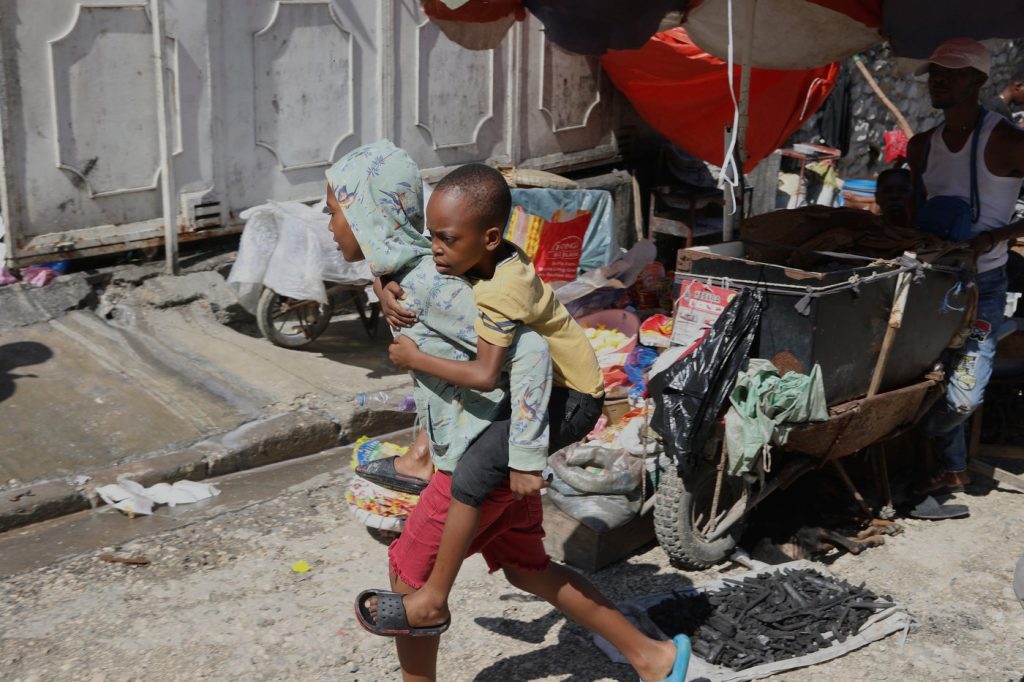PORT-AU-PRINCE, Haiti (AP) — A new report indicates that more than half of Haiti's population is expected to face severe hunger through June 2025, with an alarming 8,400 individuals living in makeshift shelters projected to starve. The findings come from the Integrated Food Security Phase Classification, a collaborative U.N. initiative that assesses food insecurity and malnutrition globally. The analysis reveals a concerning increase of over 300,000 people facing severe hunger since last year, bringing the total to approximately 5.7 million.
The report attributes this escalating crisis primarily to relentless gang violence and a debilitating economic collapse. Among those suffering from hunger is Jackie Jean-Jacques, a 52-year-old former bus driver who lost his home due to gang violence. He and his family have been living in a crowded makeshift shelter for over a year. "There are days where the kids have to live on sugar water and bread," Jean-Jacques lamented, emphasizing the desperation of their situation.
Jean-Jacques, who can no longer afford the costs associated with his former job, including renting a bus and purchasing gasoline, worries about the potential of gang violence targeting public transportation. His wife sells small items such as plastic cups and lunch boxes on the street, but income from this work is insufficient to feed their family. "This is not enough to feed us," he expressed, highlighting the dire conditions many families are enduring.
The situation is exacerbated by dwindling aid. Following the decision in late February 2025 by the administration of former U.S. President Donald Trump to terminate 90% of USAID foreign aid contracts, the availability of food and clean water assistance has sharply declined. The report notes that while nearly 977,000 Haitians received humanitarian food aid monthly from August 2024 to February 2025, rations were reduced by up to half, making it increasingly challenging for families to meet their basic food needs.
UNICEF has reported that an estimated 2.85 million children, which is about one quarter of Haiti's total child population, are facing high levels of food insecurity. The organization faces a staggering 70% funding shortfall and has only managed to assist a small fraction—4%—of the estimated 129,000 children requiring life-saving treatment this year. Concurrently, the U.N.’s World Food Program urgently seeks $53.7 million to maintain critical operations in Haiti over the following months. "Right now, we’re fighting to just hold the line on hunger," stated Wanja Kaaria, the WFP’s country director in Haiti.
The severity of the crisis is starkly contrasted with the situation in 2014, when just 2% of Haiti's population experienced food insecurity, driven mainly by poor rural areas. The dramatic deterioration began after Hurricane Matthew struck in 2016, devastating crops and livelihoods. Since then, the number of Haitians experiencing severe hunger has surged, underscoring a rapidly worsening humanitarian crisis.
Martin Dickler, Haiti director for the nonprofit organization CARE, emphasized the alarming statistics, stating, "It really is an extremely serious food crisis, and Haiti is one of the worst in the world." As inflation rates have soared above 30% in recent months, the cost of goods exacerbates the struggle for families already caught in the grips of poverty and violence. Gang control over major roads leading into the capital, Port-au-Prince, has severely hampered the transportation of essential goods from rural areas.
Additionally, women and girls are disproportionately affected by the ongoing crisis, facing heightened challenges in accessing food and employment. Jean Rose-Bertha, a single mother of two boys living in a makeshift shelter after being driven from her home by gang violence, remarked, "I can barely feed them. I sometimes do things I’m not supposed to do," revealing the extreme measures some are forced to take to survive.
The complexities of this dire situation highlight the urgent need for comprehensive assistance and intervention to prevent further suffering and degradation of living conditions for millions in Haiti.












